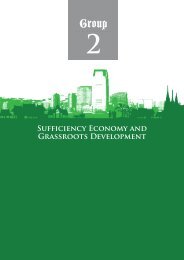Conflict, Legitimacy and Government Reform: Equitable Allocation of ...
Conflict, Legitimacy and Government Reform: Equitable Allocation of ...
Conflict, Legitimacy and Government Reform: Equitable Allocation of ...
You also want an ePaper? Increase the reach of your titles
YUMPU automatically turns print PDFs into web optimized ePapers that Google loves.
86 KPI Congress XI<br />
their national life. The World Congress brings together civic educators<br />
from around the world who work with Center materials to share best<br />
practices <strong>and</strong> motivate each other to even greater achievements.<br />
Africa. African independence brought with it a wave <strong>of</strong> optimism<br />
<strong>and</strong> experiments in democratic rule that did not <strong>of</strong>ten endure. African<br />
schools usually reflected the repressive patterns <strong>of</strong> behavior practiced in<br />
the wider culture. Literacy levels are low <strong>and</strong> delivery <strong>of</strong> basic<br />
government services, including education, weak. Still, the Center’s<br />
programs have found an enthusiastic audience in many African countries<br />
including Nigeria, Senegal, South Africa, Malawi, Mauritius, <strong>and</strong> others.<br />
Africa is one <strong>of</strong> only two regions that have so far held regional Project<br />
Citizen showcases.<br />
Asia. The wide acceptance <strong>of</strong> Project Citizen throughout some <strong>of</strong><br />
the most populous states <strong>of</strong> Asia provides one answer to the question <strong>of</strong><br />
whether Asian “culture” is not suited to the theory <strong>and</strong> practice <strong>of</strong><br />
“Western” liberal democracy. In only four years Project Citizen has<br />
grown from a limited pilot program to one that is used by nearly a<br />
million students in China <strong>and</strong> India. These two countries present quite<br />
different contexts for the introduction <strong>of</strong> civic education curricula.<br />
China has made a successful transition to a market economy within a<br />
formally Communist political system. Marxism-Leninism remains a<br />
formal part <strong>of</strong> the school curriculum, but is widely seen as anachronistic<br />
<strong>and</strong> irrelevant to the future direction <strong>of</strong> the country. School authorities<br />
at the provincial level, where most educational decisions are made <strong>and</strong><br />
funded in China, are concerned that they may be raising a generation <strong>of</strong><br />
children who reject the formal citizenship <strong>and</strong> value education they<br />
receive, but receive no alternative within the educational system. Project<br />
Citizen, used as an extracurricular subject, does not challenge the existing<br />
civic education structure directly, but <strong>of</strong>fers a modern, engaging, <strong>and</strong><br />
substantive alternative to it. At a recent training <strong>of</strong> teachers for a pilot<br />
Project Citizen program in a province <strong>of</strong> more than 80 million<br />
inhabitants, the number two educational <strong>of</strong>ficial for the province<br />
admonished the teachers to take their training seriously as “what you are<br />
doing today will prepare our students to make the next important














